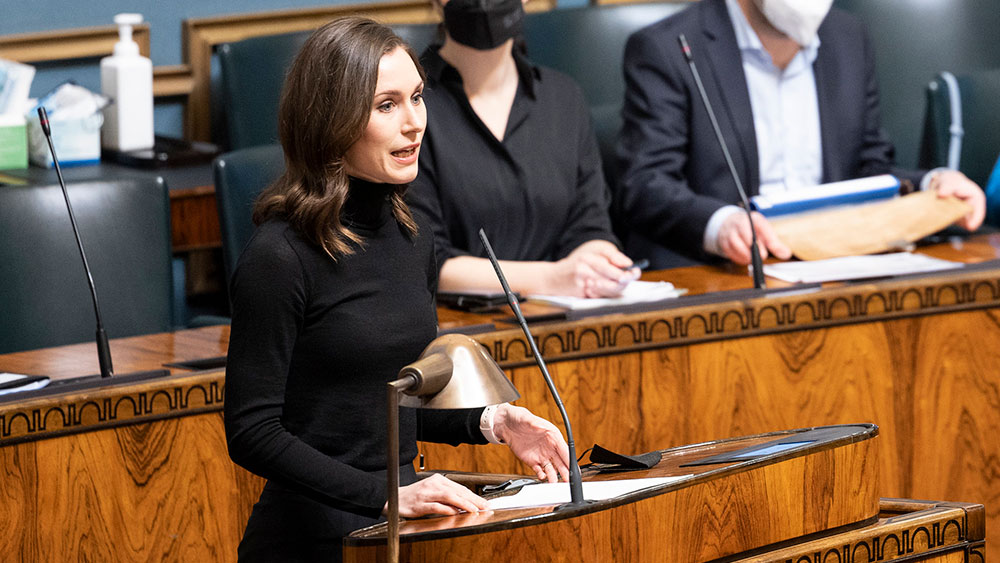Speech delivered by Prime Minister Sanna Marin at Parliament’s topical debate on 15 March 2022

Prime Minister Sanna Marin gave an opening speech on the current foreign and security policy situation at Parliament's topical debate on Tuesday 15 March 2022. Speech to be checked against delivery.
Mr Speaker,
Russia is continuing its invasion of Ukraine with devastating consequences for the Ukrainian people. Russia’s military actions have been strongly and unequivocally condemned by the international community at large.
This past Sunday marked the anniversary of the end of the Winter War. We, too, fought for our independence then, and now the citizens of Ukraine are in the same situation.
Many Finns are now offering help to Ukraine. Protective equipment, medical supplies and weapons from Finland are already being used by Ukrainians as they defend themselves against the aggressor.
Russia has found its only friend in the leadership of Belarus, whose actions against Ukraine are also reprehensible.
President Vladimir Putin is in a decisive position. The leaders of many countries, including President of the Republic Sauli Niinistö, have tried to persuade him to end the war.
But Russia’s words so far, no matter where they have come from, have had nothing to do with genuine peace efforts.
At the end of last week, the leaders of the European Union held a meeting in Versailles. In that meeting, we urged Russia to cease its military aggression immediately and unconditionally. Those responsible for war crimes will be brought to justice. We will move swiftly to intensify the sanctions, which are already having a significant impact on the Russian economy.
The European Union fully supports Ukraine’s independence, self-determination and territorial integrity. We sent a message of hope to Ukrainians from Versailles: Ukraine belongs to our European family. Ukraine has submitted its application to become a member of the European Union and we will soon receive an opinion on it from the Commission. At the same time, we are reinforcing our support to Ukraine.
The informal European Council in Versailles showed that the Union can be united, fast and decisive when necessary.
Discussions at the meeting highlighted the consensus that solidarity is increasingly important for Europe. Finland plays an active role in ensuring that the EU’s mutual assistance obligation is credible and effective. We work in close cooperation with Sweden in this area.
Most EU Member States base their defence on NATO’s security guarantee, deterrence and collective defence. The EU does not seek to create overlapping solutions with NATO; instead, cooperation between the EU and NATO is a resource and a necessity.
The EU will invest more in its defence capabilities, intensify cooperation in areas such as cybersecurity, and seek incentives for joint initiatives. In our meeting last week, we noted that we must be able to use the EU’s toolkit more effectively to prepare for hybrid warfare. We must also strengthen the EU’s technological and industrial base in the field of defence, and the Commission’s defence package provides a good foundation for this work.
Still ahead of us is the discussion on where the European Union can find the resources for the work it has started. We need to find the means to do this so that we can strengthen the EU to the level required by the security environment.
Our next step will be to finalise the Strategic Compass for the European Union, which we will present to the European Council next week.
In our meeting in Versailles, we also began work to dismantle the European Union’s dependence on Russian energy. The EU must become independent of Russian gas, oil and coal as soon as possible. Achieving climate objectives and strengthening energy security go hand in hand.
We now have an opportunity to phase out fossil fuels even sooner than planned and to complete the work on linking the European gas and electricity networks, for example. Finland’s security of supply is at a high level, but we must be thoroughly prepared for the coming winter with respect to the whole of Europe.
We must also work to reduce Europe’s economic dependencies. We must explore a wide range of national measures to mitigate the effects of the crisis and support conditions for growth. We will continue the discussion we started in Versailles on possible EU-level measures and options next week.
In April, the Government will submit a report to Parliament detailing a wide range of national measures to respond to the situation. Parliament is the right place to discuss it.
An important part of the report will focus on foreign and security policy. Finland’s most important frame of reference and security community is the European Union, which is acting with unprecedented determination in the current situation.
After the end of the Cold War, we joined the European Union as part of our political and economic integration with the West. Our policy has been consistently based on the premise that Finland is a militarily non-allied state that maintains a strong and credible national defence capability. We seek to strengthen this capability through defence cooperation, and the recent meeting of President of the Republic Sauli Niinistö with President Joe Biden set the course for our cooperation with the United States going forward. Minister of Defence Antti Kaikkonen will soon speak about steps we have recently taken.
We have managed to preserve our national room for manoeuvre and our options, including the opportunity to apply for NATO membership.
That said, the post-Cold War order has broken. We now see how Russia is likely to operate for a very long time to come. In this new environment, Finland, too, must assess ways to strengthen security. Parliament is the right place to discuss this issue, and I would like to thank you for inviting me to present this overview of the current situation.